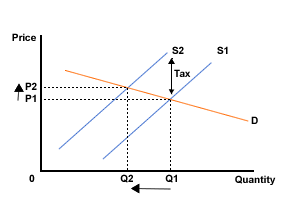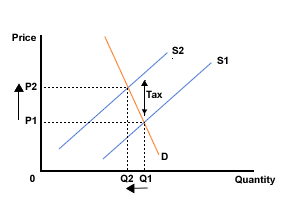PED and taxation
Syllabus: Examine the significance of PED for government in relation to indirect taxes.
The imposition of an indirect tax (tax on a good shifts supply curve upwards by the amount of the tax) usually means that the price increases. However, the amount of the price increase will depend on the price elasticity of demand PED. Compare Figures 1 and 2 to see the difference.

Figure 1 Tax imposed on a good with elastic demand

Figure 2 Tax imposed on a good with inelastic demand

1 |
Tax revenueIf you aimed as a government solely to reduce the consumption of the good, which type of good would you be taxing? |
2 |
Tax revenue (2)If you aimed as a government to tax goods simply to raise tax revenue, which type of good would you tax? |
So, for a government wishing to raise revenue from indirect taxation, they will always tend to impose the taxes on goods with relatively inelastic demand. The more inelastic the demand, the more the price will rise and therefore the more of the tax will be passed on to the consumer.
Are tobacco, alcohol, petrol PED elastic or inelastic? Are they taxed highly or not taxed?
